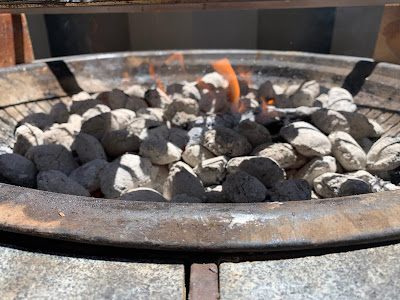 |
| The fire from a braai by my brother-in-law, 21 February 2021 |
 |
| Hot coals from a braai by my Dad last Sunday, 29 February 2021 |
What can I do? Making time for uninterrupted daily prayer is an excellent place to start if this is currently sketchy or possibly a non-feature.
Step 1 - Make the time (set a date with your friend)
First, we need to book an appointment with God. Start out small, carve out 10 minutes every morning to talk with God is a great start (for perspective, the average person spends 53 minutes browsing Instagram every day). As time goes by, this could be increased incrementally by 5 minutes to the point where you can pray for a maximum of 30 minutes with God.
Hang on! I start work early, prepare breakfast for the family, prepare for an early morning exam, or get the kids to school. What about morning traffic? Mornings are great to check my emails, get ready for that early appointment, make an early morning gym session, and the list goes on… Life is busy, and God understands that. Still, let's make time for him in our day. Why? When we do, He multiplies our ability to execute chores, similar to how he miraculously multiplied the bread loaves.
Step 2 - Have a plan (strategically organise the coals for your fire)
Will power is simply the ability to control yourself. So when you give up a coffee or chocolate, we train our self-control, with the motivation to return to it after Lent, perhaps? Although going to bed 10 minutes earlier to make time for prayer or turning off my car radio and listening to a podcast that guides me in prayer is a far greater sacrifice? Yes, it is time that can never be regained for our satisfaction and a gift that leads us to a deeper conversation with God.
Think about how you could keep an awareness of God throughout the day? Perhaps, taking two minutes at midday (12pm) to recite the Angelus? How about surfing mobile apps you can easily download (find a list of recommended apps and podcasts at the end of the blog). Could I resolve every afternoon to pray the rosary while driving home through the afternoon traffic? Taking time out to read a spiritual book for ten minutes during my lunch break? Maybe, examine my conscience for three minutes before bed?
Step 3 - Execute the plan (ignite the firelighters and get the fire going)
Procrastination is our greatest enemy. Forming a habit takes time, and we are going to fail every now and then. But, we need to see the fire of our spiritual life as more than habit-forming. It encompasses our soul, our very being, that we raise to God each moment we make time for Him and do these things out of love.
When I was growing up, my younger cousin, Dylan, and I, after a braai, would sneak off in my aunt and uncle's garden and break off branches from their bay leaf tree and throw it into the fire. We loved the sound of the crackling and flames that would ignite from the oils in the bay leaf. Our parents would often tell us to not do it as it made lots of smoke, but as soon as they were not looking, we would throw more into the fire. Until, before we knew it, the fire was smothered and gasping for oxygen.
Step 4 - Revisit the plan (fan the fire when it grows faint)
We all have the tendency to go back on our goals. So, we need to shake things up every now and then or try new ideas to keep the spiritual life awake and alert to the gentle knocking of God on the door of our hearts. But, like any great athlete, practice makes perfect. So, consistency is key to keeping the flame burning bright.
If we feel at some point or another that the fire of our spiritual life is somewhat dull or barely flickering enough to see any hope for the future. You could then be at step 4, which calls for a timeout to reflect on the plan altogether. Lent is a time to make sacrifices, but with the intent of paying serious attention to your interior fire. Suppose we use this Lent to stoke the coals, add fresh coals, or fan those dying coals of our interior life. In that case, we will come out of Lent with a more vital interior flame (that is, a grace of the Holy Spirit).
"The most powerful weapon on earth is the human soul on fire." (Ferdinand Foch)
Enjoy reading this blog? Stay posted by subscribing above. Do you know of a friend who could be interested in reading this blog? Please feel free to share the link below.
Recommended list of apps and podcasts to help your prayer life:
- Laudate App (include daily readings, Bibles, thousands of prayers, rosary guides, digital catechism, and much more).
- iPray with the Gospel (a brief reflection on the daily Gospel with some great prayers before and after Mass).
- Life is Worth Living: A Fulton J. Sheen Catholic Podcast (mind-blowing meditations by the New Yorker Venerable Fulton Sheen).
- Ask Christopher West Podcast (Christopher and Wendy West address questions on faith, life, love, and sexuality in light of St. John Paul II's Theology of the Body).
- St. Josemaria Institute Podcast (share weekly reflections by a priest to guide daily prayer and help you grow closer to God).
Comments